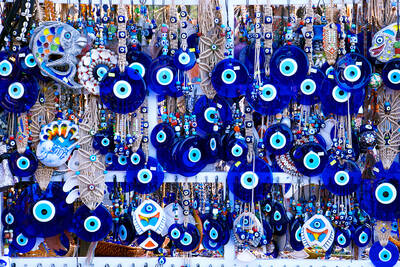The octopus may be smarter than you think. Australian scientists revealed the eight-tentacled species can carry coconut shells to use as armor — the first case of an invertebrate using tools.
Research biologist Julian Finn said he was “blown away” the first time he saw the fist-sized veined octopus, Amphioctopus marginatus, pick up and scoot away with its portable protection along the sea bed.
“We don’t normally associate complex behaviors with invertebrates — with lower life forms I guess you could say,” Finn, from Museum Victoria, told AFP.
“And things like tool-use and complex behavior we generally associate with the higher vertebrates: humans, monkeys, a few birds, that kind of thing.
“This study, if anything, shows that these complex behaviors aren’t limited to us. They are actually employed by a wide range of animals.”
The use of tools is considered one of the defining elements of intelligence and, although originally considered only present in humans, has since been found in other primates, mammals and birds.
But this is the first time that the behavior has been observed in an invertebrate, according to an article co-authored by Finn and published in the US-based journal Current Biology.
Finn said when he first saw the octopus walk along awkwardly with its shell, he didn’t know whether it was simply a freak example of wacky underwater behavior by the animal whose closest relative is a snail.
“So over the 10-year period basically we observed about 20 octopuses and we would have seen about four different individuals carrying coconut shells over large distances,” he said of his research in Indonesia.
“There were lots that were buried with coconuts in the mud. But we saw four individuals actually pick them up and carry them, jog them across the sea floor carrying them under their bodies. It’s a good sight.”
Finn said the animals were slower and more vulnerable to predators while carrying the broken shells, which they later used as shelters.
“They are doing it for the later benefit and that’s what makes it different from an animal that picks up something and puts it over its head for the immediate benefit,” he said.
Other animals were likely to be discovered to exhibit similar behaviors, he said. (AFP)
章魚可能比你想像中更聰明。澳洲科學家發現,八腳章魚會拿椰殼當盔甲──這是科學界發現無脊椎動物使用工具的首例。
生物研究學者朱利安.芬恩說,他第一次看到這種拳頭大小的紋理章魚在海底撿起椰殼,並隨身帶著這護殼溜走時「驚為天人」。
維多利亞博物館的芬恩對法新社說:「我們通常不會把複雜行為和無脊椎動物──我想或可說是低等生物──聯想在一起。」
「提到使用工具和複雜行為這類事情,我們通常會聯想到較高等的脊椎動物:人類、猴子、些許鳥類等。」
「要說有什麼的話,這項研究顯示,不只有人類會有這種複雜行為。事實上,各種動物都會出現這類行為。」
工具的使用被視為智慧高低的關鍵因素之一,雖然該行為原來被視為是人類特有的表現,但科學家後來在其他靈長類、哺乳類和鳥類等動物身上也發現同樣行為。
但芬恩和他人共同著作、發表在美國期刊《現代生物學》上的文章指出,這是科學家第一次在無脊椎動物身上觀察到這種行為。
芬恩說,他第一次看到章魚背著殼笨拙地前進時,他不知道這隻蝸牛近親的瘋癲行為,是否僅是海底的一個特例。
談及他在印尼進行的研究時,他說:「因此,過去十年間,我們主要觀察了約二十隻章魚,看到有四隻章魚背著椰子殼行走了一大段距離。」
「許多(章魚)和椰殼一起埋在泥下,但我們只看到四隻章魚真正撿起椰殼帶著走,他們把椰殼抱在身下,在海底慢步了一段。那景象很有趣。」
芬恩說,章魚行動速度較慢,比較容易受到掠食者的攻擊,然而背著破椰殼可以躲避攻擊,後來牠們便以此作為遮蔽的屏障。
他說:「他們背著椰殼走是為了可能面臨的攻擊作準備,這和其他動物面臨攻擊時才隨手撿個東西放在頭上遮蔽不同。」
他說,其他動物也可能表現出類似的行為。
(法新社╱翻譯:袁星塵)

Rice is essential to Japanese culture, tradition and politics. People take pride in the oval-shaped sticky Japonica grain, which is still a staple even though total consumption has fallen over the decades. But since last summer, prices have soared as supplies have fallen short of demand. The government has long paid farmers to cut back on rice acreage, and change to other crops to keep rice prices relatively high. To cope with shortfalls this year, the government has released rice reserves. But the grain has been slow to reach supermarket shelves. Anger over that was part of the reason the Agriculture Minister

Step into any corner of Turkiye, and you’ll likely encounter the iconic “Evil Eye,” known as “nazar boncu?u” in Turkish. This striking blue glass ornament is shaped like an eye with concentric circles of dark blue, white, and light blue. While its name in English suggests something threatening, it’s actually a charm designed to ward off misfortune. The origins of the nazar boncu?u can be traced back to ancient Mediterranean and Middle Eastern traditions. The word nazar comes from Arabic, meaning “gaze,” while boncu?u translates to “bead” in Turkish. Central to the nazar boncu?u’s mythology is the idea that

Continued from yesterday(延續自昨日) https://www.taipeitimes.com/News/lang In 1946, the company adopted the name 7-Eleven to reflect its newly extended __3__, from 7am to 11pm, a novel concept at the time. As a rapidly growing company, it began offering franchise opportunities in the 1960s. In 1974, the first 7-Eleven in Japan was opened by the supermarket company Ito-Yokado. The Japanese franchises were __4__ successful that by 1991, Ito-Yokado was able to acquire a 70 percent stake in Southland Corporation. Its investments eventually resulted in full ownership of 7-Eleven, which paved the way for the Japanese company to enter the international market. Since then, 7-Eleven

A: Wow, Les Miserables Staged Concert Spectacular is visiting Taiwan for the first time. B: Isn’t Les Miserables often praised as one of the world’s four greatest musicals? A: Yup. Its concert is touring Taipei from tonight to July 6, and Kaohsiung between July 10 and 27. B: The English version of the French musical, based on writer Victor Hugo’s masterpiece, has been a huge success throughout the four decades since its debut in 1985. A: The musical has never toured Taiwan, but going to the concert sounds like fun, too. A: 哇,音樂劇《悲慘世界》紀念版音樂會首度來台巡演! B: 《悲慘世界》……它不是常被譽為全球四大名劇之一嗎? A: 對啊音樂會將從今晚到7月6日在台北演出,從7月10日到27日在高雄演出。 B: 這部法文音樂劇的英文版,改編自維克多雨果的同名小說,自1985年首演以來,在過去40年造成轟動。 A: